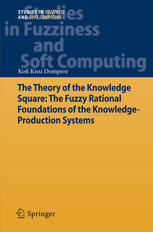

Most ebook files are in PDF format, so you can easily read them using various software such as Foxit Reader or directly on the Google Chrome browser.
Some ebook files are released by publishers in other formats such as .awz, .mobi, .epub, .fb2, etc. You may need to install specific software to read these formats on mobile/PC, such as Calibre.
Please read the tutorial at this link: https://ebookbell.com/faq
We offer FREE conversion to the popular formats you request; however, this may take some time. Therefore, right after payment, please email us, and we will try to provide the service as quickly as possible.
For some exceptional file formats or broken links (if any), please refrain from opening any disputes. Instead, email us first, and we will try to assist within a maximum of 6 hours.
EbookBell Team

4.3
18 reviewsThe monograph is about a meta-theory of knowledge-production process and the logical pathway that connects the epistemic possibility to the epistemic reality. It examines the general conditions of paradigms for information processing and isolates the classical and fuzzy paradigms for comparative analysis. The sets of conditions that give rise to them are defined, stated and analyzed to abstract the corresponding sets of laws of thought. The fuzzy paradigm with its corresponding logic and mathematics is related to inexact symbolism for the defective information structure where the results of the knowledge production must satisfy the epistemic conditionality, composed of fuzzy conditionality and fuzzy-stochastic conditionality under the principle of logical duality with continuum. The classical paradigm with its corresponding logic and mathematics is related to exact symbolism for exact information structure where the vagueness component of the defectiveness is assumed away, and where the results of the knowledge production must satisfy no epistemic conditionality or at the maximum only the stochastic conditionality under the principle of logical dualism with excluded middle. It is argued that the epistemic path that links ontological space to the epistemological space is information. The ontological space is taken as the primary category of reality while the epistemological space is shone to be a derivative. Such information is universally defective and together with assumptions imposed guides the development of paradigms with their laws of thought, logic of reasoning, mathematics and computational techniques. The relational structure is seen in terms of logical trinity with a given example as matter-information-energy transformational trinity which is supported by the time trinity of past-present-future relationality. The book is written for professionals, researchers and students working in philosophy of science, decision-choice theories, economies, sciences, computer science, engineering, cognitive psychology and researchers working on, or interested in fuzzy paradigm, fuzzy logic, fuzzy decisions, and phenomena of vagueness and ambiguities, fuzzy mathematics, fuzzy-stochastic processes and theory of knowledge. It is further aimed at research institutions and libraries. The subject matter belongs to extensive research and development taking place on fuzzy phenomena and the debate between the fuzzy paradigm and the classical paradigm relative to informatics, synergetic science and complexity theory. The book will have a global appeal and across disciplines. Its strength, besides the contents, is the special effort that is undertaken to make it relevant and accessible to different areas of sciences and knowledge production.